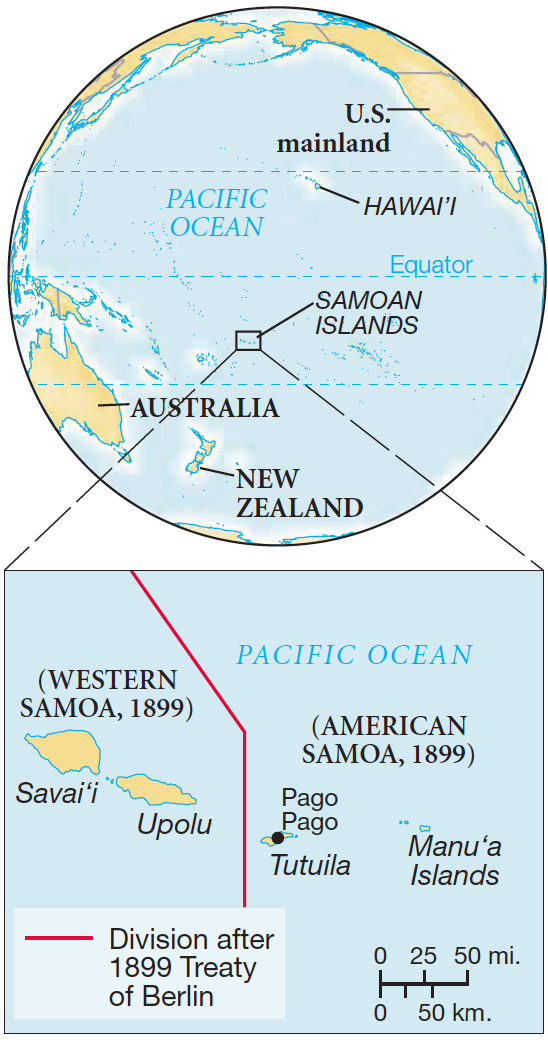The Monroe Doctrine and the Open Door Policy
Printed Page 601
The emergence of the United States as a world power pitted the nation against other colonial powers, particularly Germany and Japan, that posed a threat to the twin pillars of America’s expansionist foreign policy. The first, the Monroe Doctrine, came to be interpreted as establishing the Western Hemisphere as an American “sphere of influence” and warned European powers to stay away or risk war. The second, the Open Door, dealt with maintaining market access to China.
 President James Monroe’s 1823 declaration that the Western Hemisphere was closed to further colonization or interference by European powers. In exchange, Monroe pledged that the United States would not become involved in European struggles. The United States strengthened the doctrine during the late nineteenth century.
President James Monroe’s 1823 declaration that the Western Hemisphere was closed to further colonization or interference by European powers. In exchange, Monroe pledged that the United States would not become involved in European struggles. The United States strengthened the doctrine during the late nineteenth century.
American diplomacy actively worked to buttress the Monroe Doctrine, with its assertion of American hegemony (domination) in the Western Hemisphere. In the 1880s, Republican secretary of state James G. Blaine promoted hemispheric peace and trade through Pan-American cooperation but at the same time used American troops to intervene in Latin American border disputes. In 1895, President Cleveland risked war with Great Britain to enforce the Monroe Doctrine when a conflict developed between Venezuela and British Guiana. After American saber rattling, the British backed down and accepted U.S. mediation in the area despite their territorial claims in Guiana.

In Central America, American business triumphed in a bloodless takeover that saw French and British interests routed. The United Fruit Company of Boston virtually dominated the Central American nations of Costa Rica and Guatemala, while an importer from New Orleans turned Honduras into a “banana republic” (a country run by U.S. business interests). Thus, by 1895, the United States, through business as well as diplomacy, had successfully achieved hegemony in Latin America and the Caribbean, forcing even the British to concur that “the infinite resources [of the United States] combined with its isolated position render it master of the situation and practically invulnerable as against any or all other powers.”
At the same time that American foreign policy warned European powers to stay out of the Western Hemisphere, the United States competed for trade in the Eastern Hemisphere. As American interests in China grew, the United States became more aggressive in defending its presence in Asia and the Pacific. In 1889, it risked war with Germany to guarantee U.S. naval access to Pago Pago in the Samoan Islands, a port for refueling on the way to Asia. Germany, seeking dominance over the islands, sent warships to the region. But before fighting broke out, a typhoon destroyed the German and American ships. The potential combatants later divided the islands amicably in the 1899 Treaty of Berlin.
In the 1890s, China, weakened by years of internal warfare, was partitioned into spheres of influence by Britain, Japan, Germany, France, and Russia. Concerned about the integrity of China and no less about American trade, Secretary of State John Hay in 1899–1900 wrote a series of notes calling for an “open door” policy that would ensure trade access to all and maintain Chinese sovereignty. The notes were greeted by the major powers with polite evasion. Nevertheless, Hay skillfully managed to maneuver them into doing his bidding, and in 1900 he boldly announced the Open Door as international policy. The United States, by insisting on the Open Door policy, managed to secure access to Chinese markets, expanding its economic power while avoiding the problems of maintaining a far-flung colonial empire on the Asian mainland. But as the Spanish-American War soon demonstrated, Americans found it hard to resist the temptations of overseas empire.
 Policy successfully insisted upon by Secretary of State John Hay in 1899–1900 recommending that the major powers of the United States, Britain, Japan, Germany, France, and Russia should all have access to trade with China and that Chinese sovereignty should be maintained.
Policy successfully insisted upon by Secretary of State John Hay in 1899–1900 recommending that the major powers of the United States, Britain, Japan, Germany, France, and Russia should all have access to trade with China and that Chinese sovereignty should be maintained.